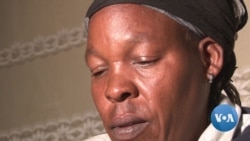Human Rights Watch has accused Kenya's police force of carrying out the extrajudicial killings of around two dozen young men and boys in the low-income areas of Nairobi over the past year.
In a report published earlier in July, the rights group said it documented the cases but that many more have occurred in these areas, known as informal settlements. Police have not responded to VOA requests for comment.
Fedisia Wamburu remembers vividly that Friday night in February when the news broke. She said at about eight in the morning, her youngest son came into the house and asked, 'Mom, you are sitting here and my brother has been killed.'"
When she went to the police station, she was told her son was killed for snatching a mobile phone. But she denies he was a criminal and sees no justification for the way he died.
Wamburu said when she later went to the morgue, she found her son had been killed in a beastly manner. She said he had seven bullet wounds. She said her efforts to seek justice for her son's killing have so far been fruitless.
At the Mathare Social Justice Center, coordinator Kennedy Kyungu has for the last seven years documented killings at the informal settlements.
"The age is between 13 to 27," he said. "That is the age of young guys who are being executed in the informal settlements. Their reason is they are fighting crime."
In its latest report, Human Rights Watch said Kenyan police have killed at least 21 men and boys in Nairobi's low-income areas since August of last year.
"The specific cases that we documented were 21, but we heard of many more," said the organization's lead researcher Otsieno Namwaya. "What we heard was that police would raid houses at night, force the victims to kneel but then police would go ahead and shoot them.
Police have not responded to VOA's requests for comment. But Human Rights Watch says they deny their officers have committed any crimes.
Namwaya says police have not conducted any investigations.
"Kenyan law requires that any killing by police should be followed by an inquest, especially if the circumstances of the death are questionable," he said. "So all these killings that we are talking about, there should have been an inquest, but police have not started an inquest."
Back in Mathare, Fedisia Wamburu joins the list of mothers who have lost their sons, allegedly at the hands of police — and whose hope for justice is fading away.







